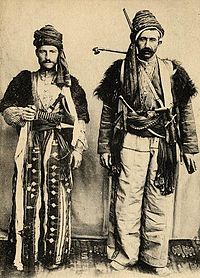Chaldean Christians

Chaldean Catholics from Mardin, 19th century.
|
|
| Total population | |
|---|---|
| 1,800,000 (2016) | |
| Regions with significant populations | |
|
|
230,071(2012) |
|
|
30,000(2012) |
|
|
3,900(2014) |
|
|
7,640 (2013) |
| Diaspora | Several hundred thousand |
|
|
235,000 (2014) |
|
|
9,005 (by ancestry, 2011 Census) 35,000 (according to The Hierarchy of the Catholic Church) |
|
|
18,668 (2013) |
| Religions | |
| Syriac Christianity (in union with Rome), Chaldean Catholic Church | |
| Scriptures | |
| The Bible | |
| Languages | |
|
Neo-Aramaic Chaldean Neo-Aramaic, Arabic |
|
Chaldean Christians /kælˈdiːən/ (ܟܠܕܝ̈ܐ), also known as Kaldaye and Kaldanaye, are ethnic Assyrians Syriac Christian adherents of the Chaldean Catholic Church which emerged from the Church of Assyria and Mosul in 1681 and from the Church of the East in 1830. Assyrians are mentioned as a distinct ethnic group in Article 125 of the Iraqi constitution.
While originating in Mesopotamia and the wider region (north of Iraq, southeast Turkey and northeast Syria), many Chaldean Catholic Christians have migrated to Western countries like the USA, Canada, Australia, Sweden and Germany. Many of them also live in Lebanon, Egypt, Israel, Jordan, Iran, Turkey and Georgia. The reasons for migration are the poor economic conditions during the Sanctions against Iraq, Religious persecution and Ethnic persecution and poor security conditions after the 2003 invasion of Iraq.
The terms Chaldean and Chaldo-Assyrian are terms used to describe the group of Assyrians who broke from the Assyrian Church of the East in what is known as the Schism of 1552 and entered into communion with the Roman Catholic Church, after at first failing to gain acceptance within the Syriac Orthodox Church. Rome initially named this new church structure The Church of Assyria and Mosul in 1553, and only some 128 years later, in 1681, was this changed to The Chaldean Catholic Church, despite none of its adherents (or neighbouring peoples) having hitherto used the name "Chaldean" to describe themselves or their church, or having originated in the region in the far south of Mesopotamia which had long ago once been Chaldea.
...
Wikipedia
